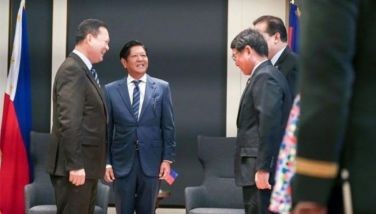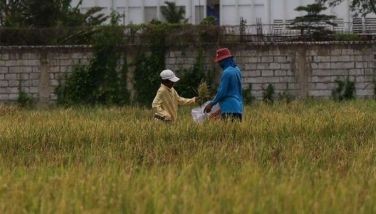Chinese entrepreneurs

SINGAPORE – The Chinese are as ubiquitous in world cities as Pinoys. But when Pinoys go abroad, they look for jobs... to be employed by someone. When the Chinese go abroad, it is to establish a business. It may be a one man or one family trading business that they grow into something big.
I thought about the Chinese entrepreneurs I met in South Africa during my long flight back to this city state. It is simply amazing how so many of them have uprooted families in China and Taiwan to try to make it big in this land so far away. It seems Chinese migration of potential taipans is a continuing development through the centuries.
When our famous Chinoy taipans, like Henry Sy, came to the Philippines, it was to escape poverty in China. Indonesian Chinese, like the Salims, and the Singaporeans who trace their ancestry to southern Chinese provinces got to Southeast Asia also in search of a better life. Sheer guts and entrepreneurship enabled them to find their fortunes away from home.
With China now a top world economic power, thousands of Chinese are still leaving for strange new places in search of their fortunes. China just isn't big enough. And as the Chinese business scene becomes more bureaucratic and controlled by a few well connected big guns, how can an ambitious young taipan-to-be establish himself?
The young leader of one of the Chinese Chambers of Commerce in South Africa took his bride from a place near Xiamen to South Africa and never looked back. His two sons were born in South Africa and speak the local language in addition to English and Mandarin. That they study in an International School suggests the family is pretty well off.
Our tour guide in Cape Town is a Taiwanese who came to South Africa with his family when he was a nine year old boy. Now a South African citizen, he is very much at home in his adopted country. His family has brought over their grandparents as well from Taiwan.
They claim there are now 300,000 Chinese in South Africa and upwards of 800,000 for all of Africa. One of the two drivers is China's massive foreign aid that brought in Chinese workers to build railroads and other infrastructure. The other is Chinese entrepreneurial spirit that seeks opportunities from wherever they can find these. Many, if not most, start off as traders and move to manufacturing from there.
Another Chinese active in South Africa's business circle started trading marble. He bought marble and shipped the stuff to China for processing before selling in the world market. He eventually bought hectares of South African land and started his own quarry operations. He isn't doing badly at all. People like them can spark economic growth in a country as what happened in Singapore, Indonesia and Thailand.
But the question rises: how come the Chinese who went to the Philippines didn't have the same positive effect on the Philippines as the Chinese who went to our neighboring countries did?
Even the richest and most successful of our taipans are small compared to those who ended up in other Southeast Asian countries. Yet, they came from just about the same region of southern China. Maybe it is because our Chinoys migrated much earlier, during the Spanish era and somehow absorbed our local culture faster and more deeply than the later migrants who went to Indonesia, Malaysia and Singapore.
Perhaps, my family is a good example of total assimilation. I suspect my great grandfather arrived in the Philippines during the Spanish era. By the time my grandfather was born, the Chancos were already more Filipino or even more Spanish than Chinese. My grandfather spoke fluent Spanish, not Mandarin or any of the southern Chinese dialects. He was happy to work as a salaried bureaucrat. No one in my father's generation was entrepreneurial at all. There is no taipan, however minor, in my family line.
In other words, our Chinoys took in many of the characteristics of the people during the Spanish era including aversion to business risk taking and the low social regard for traders. Many adopted bad habits that are anathema to the industrious, risk taking Chinese. Look at the old rich Chinoy families in the 1930s to the ‘50s and even ‘60s. Many of them are gone.
Indeed, some of the children of prominent pre-WW2 Chinese families in the Philippines ended up working for such upstarts as Lucio Tan. Check out the list of top Chinoy taipans and none of the old names are there. Even China Bank is now owned by the Henry Sy group not the old Chinoy family that controlled it for the longest time.
Indeed, where is Cheng Ban Yek now? I once visited a whole wing of the Shanghai Museum that exhibits the old man's art collection. The family used to be very prominent with such business brands as Baguio Oil and PBM Steel. We hardly hear about them now.
The second and third generation Chinoys lost the hunger for business adventures. The only significant exception is Henry Sy's family and John Gokongwei, but let's see if their third generation will not lose the family business mojo.
One Chinoy observer told me that their children, having tasted the very good life, didn't have the fire in their bellies, unlike their grandparents who had to struggle. The young Chinoys also want to migrate to the US like Pinoys and take on employment rather than have their own thriving businesses. They may still have Chinese surnames, but their mindsets are very Pinoy. Few can even speak decent Mandarin to survive a taxi ride in Beijing.
The most amazing Chinoy in recent years who built up one of the more exciting conglomerates today is Andrew Tan and he is a relatively recent migrant from Hong Kong. He came from humble beginnings and built the Megaworld Alliance Global businesses from scratch.
Lucio Tan was not born in the Philippines and also became big on sheer grit. But those I have talked to in the Filipino Chinese community tell me the real test will only happen after he passes on his businesses to his children.
The Chinese entrepreneurs building their businesses in South Africa told me they are not the only ones spreading their wings. There are so many Chinese entrepreneurs moving into Spain and even Latin America. They start small and end up making fortunes even as they effectively spread China's wings to cover the globe.
This is the kind of Chinese soft power that goes under the radar that can be considered an important part of China's toolkit when its leaders aim for world leadership. Greater China is now beyond Asia.
The Chinese diaspora can be a force for good for many developing economies. These migrants adopt the new countries as their own and contribute Chinese qualities that can make economies grow.
Hopefully, the next generation of Chinese South Africans or Chinese Brazilians or Chinese Europeans will not end up like many of our Chinoys who lost the entrepreneurial spirit of their grandfathers. That's part of the reason we got left behind... compared to Chinese migrants who ended up in our neighboring countries.
Boo Chanco's e-mail address is [email protected]. Follow him on Twitter @boochanco
- Latest
- Trending





























